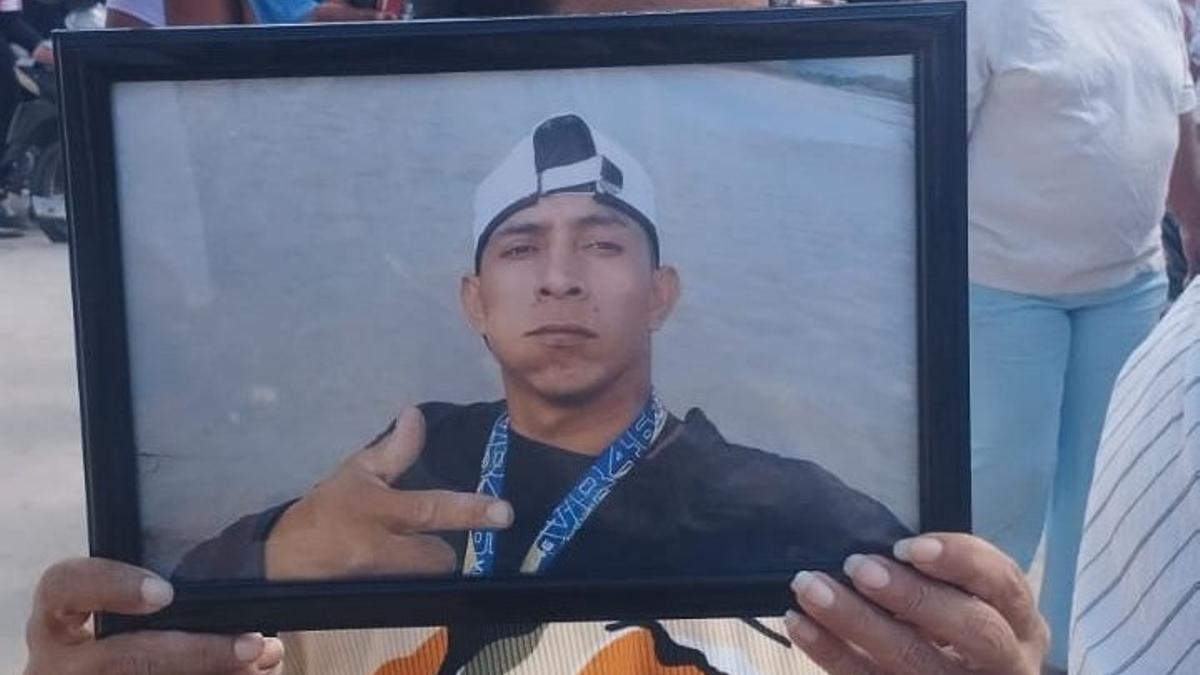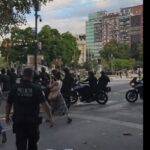
He murder of Fernando Gómeza precarious coca leaf passer from Salta on the border with Bolivia by the National Gendarmerie, and the fierce repression of family members and colleagues who claim the body, provokes indignation. The complaints are expanding that show the seriousness of what happened and the impunity with which they seek to cover it up.
It occurred days after the announcement of the “Güemes Plan” by the Minister of Security Patricia Bullrich, signed with the governor of the province of Salta Gustavo Sáenz, an ally of Sergio Massa in Unión por la Patria, and from the first moment close to the policies of the Milei government.
Last Wednesday, at dawn, around three in the morning, a group of workers were intercepted at the Gendarmerie checkpoint and began shooting. Fernando was shot in the chest and there are five wounded by firearms, two of them are very serious and at this time their lives are in danger.
After the repressive events, both officials lied, treating those who had been repressed as “violent drug traffickers,” and claimed the advancement of the “Güemes Plan,” statements that underpin the cruelty and emboldening of the security forces. It makes it clear that, under the pretext of fighting drug trafficking, they seek to cover up the objective of criminalizing poor workers like those on the border who sell on a small scale, in one of the poorest areas of the country.
“If they were drug traffickers they would live in palaces”
Alejandro Vilca, national deputy of the PTS-FITUfrom Oran, and Gisela, the sister of Fernando Gómezin a radio interview with Alejandro Bercovich in things happenedprovided more elements to delve into the social, political and criminal aspects of this new State crime. The first crime under the Milei government, but not in the case of the Minister of Security who is charged with several, such as the cases of Santiago Maldonado and Facundo Nahuel.
Fernando was a very humble 27-year-old worker, breadwinner with three small children, ages 10, 3 and 1. He lost his life working every day to bring something to eat for his family. “You have no other source of work, if you don’t work in the tobacco mill, or in citrus or vegetable farms, or you are a public employee, you have nothing to work for,” Vilca said. “Many people from the area, from Aguas Blancas or Orán, work in this informal trade that supplies many areas of the north. Some call them bagayeros, those who transport merchandise, and chancheros are those who transport coca leaves. Fernando Gómez was one of the so-called chancheros.”
For the PTS-FITU deputy for the province of Jujuy, “this response is serious because they are very humble people. I had the opportunity to go see his family, and they live in a little tin houseovercrowded, in very poor conditions. “If they were drug traffickers they would live in palaces.” “You arrive at those places and the most beautiful houses are those of the judicial officials of the province, there is a lot of poverty and in those places they are often like forgotten lands and that the response is this brutality is terrible,” Vila concluded.
Neither the first time nor the last, and they want to cover it up
Vilca commented that the workers at the site themselves say that there are more cases, such as that of a boy who appeared drowned. The Bermejo River passes on the Argentine-Bolivian border, which is a mighty river.
Although coca leaves are freely consumed, there is strict control by the Gendarmerie at the border. Gisela denounced that “the gendarmes cover each other. They grab, take away the coke, the clothes, they keep it for themselves.. This time my brother went to work like every day.” The Gendarmerie requires the payment of a fee to be able to pass. “They say it was because of that, because of the increase in the rate, and because some did not want to pay…,” he continued. “We have proof that it was a gendarmes firearm. The gendarmes say they stole their gun and shot each other. It’s not like that. Do you know what happened? The gendarme shot him and several others tried to grab my brother’s body and throw it into the river. “They didn’t even have enough to defend themselves, how can they be drug traffickers?”
Even more, they did not let her pass to get news at the Aguas Blancas hospital, where they took her brother, being notified at the same moment that it was happening. “The gendarmes, I don’t know if they were drunk or on drugs, they took us down, they started hitting me, kicking me and they blamed us because we are drug traffickers. “Why are we drug traffickers if we are going to look for news about my brother?”
To conclude, Gisela asked a question that was a sentence: “The gendarme, why didn’t he take away the load of coke? No, it wasn’t enough for him, he took my brother’s life. They didn’t let him run or anything. That’s why people got upset… Do you know why this happened, Don? People have moved and all that. Because they killed a good boy, my brother was a worker, everyone knew my little brother.”
A town
Alejandro Bercovich, a chronicler at the time of the events, and Vilca agree that There was a town after the murder and repression. “There we are getting the soldiers to leave, all the people are there, a mob has formed against this disastrous Plan Güemes of Governor Sáenz, Bullrich and Milei. There you can see very clearly how the repressive forces try to kill people. But they are going back more than ten blocks, thanks to the courage of the boys who make them go back,” says the chronicler.
“At that moment, all the forces tried to occupy the route and even so the people from the neighborhoods went to retake the route, they made the security force retreat several times. The provincial police wanted to enter the neighborhoods, almost at the door where Fernando Gómez and his family lived. They were kicked out. In the surrounding neighborhoods, such as Milagro, Libertad, 200 años, Che Guevara, Caballito, young people gathered on every corner to confront the police and throw them out, says Vilca. And he continues, at another time, “they took to the streets, they took to the road, they unloaded their anger on the closest gendarmerie post, between the town of Aguas Blancas and Orán. There were incidents there. There is another moment when the Gendarmerie tries to disperse with rubber bullets and gas, they retreat.”
In the north of Salta, cocaleros or bagayeros, in response to this brutal persecution, established a total blockage on National Route 50, at checkpoint 28, between Aguas Blancas and Orán. The protesters demand answers and denounced the violence and repression they suffer from the members of Plan Güemes.
Vilca: “This cannot go unpunished –he concludes–. They are aware that today it was Fernando’s turn and tomorrow it could be another teammate’s turn. This reached a limit. There is a whole blanket of impunity that is covered with Plan Güemes. “A strong block between Justice, the security forces and the Ministry of National Security.”
Source: www.laizquierdadiario.com
